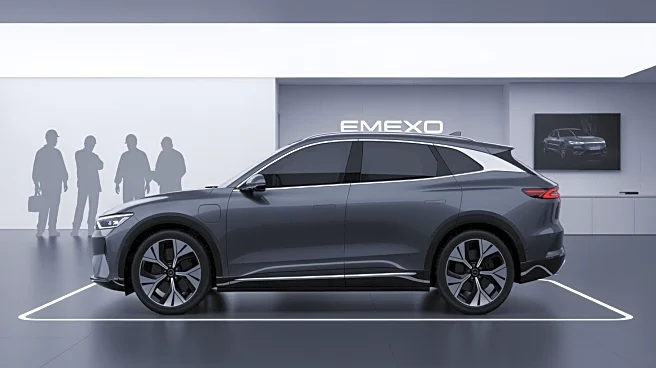What's Happening?
Electric vehicle manufacturer Rivian is set to reduce its workforce by approximately 4.5% as it gears up for the launch of its new R2 sport utility vehicle. The layoffs will primarily affect non-manufacturing roles, as the company merges vehicle operations
into its service organization and combines delivery and mobile operations into the sales group. Rivian's manufacturing team in Normal, Illinois, will not be impacted by these changes. CEO RJ Scaringe has announced he will temporarily assume the role of interim chief marketing officer to oversee the transition. The R2 SUV, expected to start production in the first half of 2026, will be priced at $45,000, significantly lower than the $76,900 starting price of the R1 SUV.
Why It's Important?
The workforce reduction at Rivian highlights the challenges faced by electric vehicle manufacturers in scaling operations while maintaining profitability. By focusing on a more affordable vehicle, Rivian aims to capture a broader market segment, potentially increasing its competitiveness against other EV makers. The decision to spare manufacturing roles suggests a strategic emphasis on maintaining production capabilities, which is crucial for meeting anticipated demand for the R2 SUV. This move could impact Rivian's market position and influence investor confidence, as evidenced by the recent fluctuations in its stock price.
What's Next?
Rivian plans to begin production of the R2 SUV in 2026, with the company focusing on efficient scaling to ensure a successful launch. The interim marketing leadership by CEO RJ Scaringe may lead to strategic shifts in how Rivian positions its new product in the market. Stakeholders, including investors and employees, will be closely monitoring the company's ability to execute its plans without further disruptions. The broader EV market will also be watching Rivian's approach to affordability and market expansion, which could set a precedent for other manufacturers.
Beyond the Headlines
The decision to reduce the workforce while sparing manufacturing roles underscores the importance of production efficiency in the EV industry. Rivian's focus on affordability with the R2 SUV may reflect broader industry trends towards cost-effective electric vehicles, potentially influencing consumer expectations and market dynamics. The company's restructuring efforts could also have implications for its organizational culture and employee morale, as it navigates the challenges of scaling operations in a competitive market.















